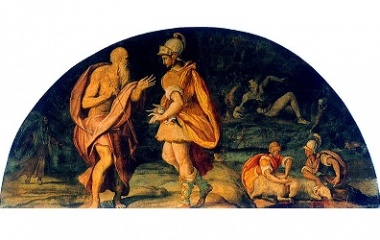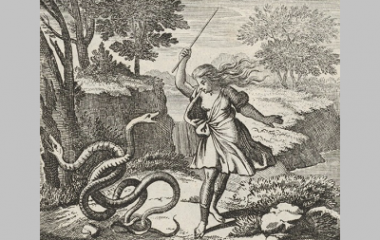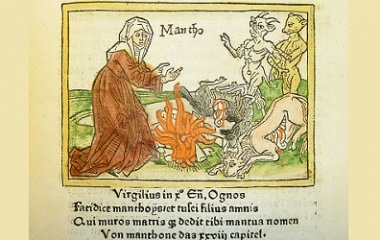- Pronunciation: tahy-REE-see-uh-s
- Origin: Greek
- Role: Prophet
- Symbols: Snakes
- Parents: Everes and Chariclo
Who Is Tiresias?
In Greek Mythology, Tiresias was a well-known prophet for Apollo. He was the son of a shepherd named Everes and a nymph named Chariclo. He resided in Thebes and played an active part in several myths, one of which involved the tragic unfolding of events surrounding the kings of Thebes, including Laius and Oedipus. He is rumored to have lived for seven generations, finally passing away after the Seven Against Thebes expedition.
Origins
Tiresias is mentioned in several mythological works, including Homer’s Odyssey. It is in this written work that his prophetic gifts are preserved in the Underworld and he is consulted by Odysseus. He is also mentioned by several other authors, including Pindar, Sophocles, Ovid and Euripides.
Legends and Stories
There are two main myths that are commonly associated with Tiresias. Both have to do with alterations to his physical being that would shape his prophetic future.
Two Snakes
When Tiresias was a young man, he came across two snakes that were mating on Mount Cyllene. For some reason, he struck the snakes and killed either both or one, depending on the version of the myth. Hera punished him for his actions and turned him into a woman. While Tiresias was a woman, she served as a priestess for Hera. This duty lasted for seven years and she even married and had children.
After seven years had passed, she came across another pair of snakes. Remembering the action that had caused her current fate, she left the snakes alone. This reversed the curse, and Tiresias was turned into a man once again.
Blindness
Tiresias was a blind prophet. However, he was not born blind. This came to be when he stumbled upon the goddess Athene while she was bathing in a lake. He found himself unable to turn away from her nakedness and was blinded by her as punishment. Tiresias’ mother begged the goddess to undo the curse, and after enough persuasion, Athena agreed. But when she tried to restore his sight, she was unable to do so. To make amends for what she had done to Tiresias, she gave him the gift of prophecy. This would point his life in a new direction.
There is an alternative story regarding the events that cause the prophet’s blindness. The second version says that Zeus and Hera were having a discussion about whether males or females experienced more pleasure during sex. Hera said that it was the male, while Zeus said it was the female. They consulted with Tiresias, as he had been both male and female. Tiresias said that the answer was definitely the woman. Hera was angered and struck him blind. Zeus, in an effort to thank him for his support, gifted him with the ability to see the future.
Tiresias in Thebes
Tiresias was from Thebes, the great Greek city. Many of his prophetic tales surround him and those around him in the great city. The first tale says that he appeared with Cadmus, who was the first king of Thebes and its founder, and warned King Pentheus about denouncing Dionysus as a god. Both Tiresias and Cadmus dressed up as worshipers of Dionysus and headed to the mountain to honor him.
In Oedipus the King, the new king of Thebes, Oedipus, consults Tiresias regarding the investigation of the previous king’s death. When first summoned, Tiresias refused to give Oedipus a direct answer. Instead, he gave the king hints. He told him that the killer was someone that the king would prefer not to discover. Oedipus angered Tiresias by telling him that his hints were just a way to cover the fact that he couldn’t actually see the future. Oedipus removed Tiresias from his palace but eventually, he discovered the truth and realized that the prophet was right.
Tiresias had another hand in the role of another king of Thebes. Oedipus eventually left the city to be ruled by his sons. They refused to share the throne though, and eventually fought each other to the death. Megaeus approached Tiresias for help, but was told that a voluntary death of a Theban was what the city needed. Megaeus committed suicide to save the city of Thebes.
Tiresias’ Death
Apollo killed Tiresias with an arrow at Tilphussa, a tainted spring. His soul immediately entered the first level of Hades. He was then visited by Odysseus, who advised him on
how to continue his voyage to Ithaca, such as how to get past Charybdis and Scylla.
Family
Tiresias did have a family but there is little documentation of it. The only reason we know that he did is because of his time spent as a woman. He did marry and bear children during this time.
Appearance
Tiresias is depicted in a variety of ways in artistic representations. Some show him as a man, while others as a woman. In some, he still has his sight, while in others he is blind. Many show him using his prophetic abilities. Other artistic works show him striking down the snakes that led to him experiencing life as a member of the opposite sex.
Tiresias can be described as a wise looking man who unfortunately was not taken seriously by many, even though he had the true gift of prophecy. His physical description includes a long beard and lifeless eyes, representing his blindness. Although he couldn’t see the literal world around him, he was able to see the future.
Symbology
The prophet is usually associated with snakes, as they were what changed his future. He is also linked to his gift of prophecy and extended lifespan. He is pictured often with a cane, which is symbolic of both his blindness and power.
Pop Culture
Even though he isn’t the most famous figure in Greek mythology, Tiresias has had a profound impact on several pop culture productions and artistic works.
He is featured in The Waste Land, a poem by T.S. Eliot. He also lends his name to a choreographed ballet that was first performed at the Royal Opera House in London’s Covent Garden in July of 1951.
The novel The Passion of New Eve by Angela Carter was a modern-day parody of the myth surrounding the famous prophet. Another novel, Orlando, by Virginia Woolf is similar in nature.










